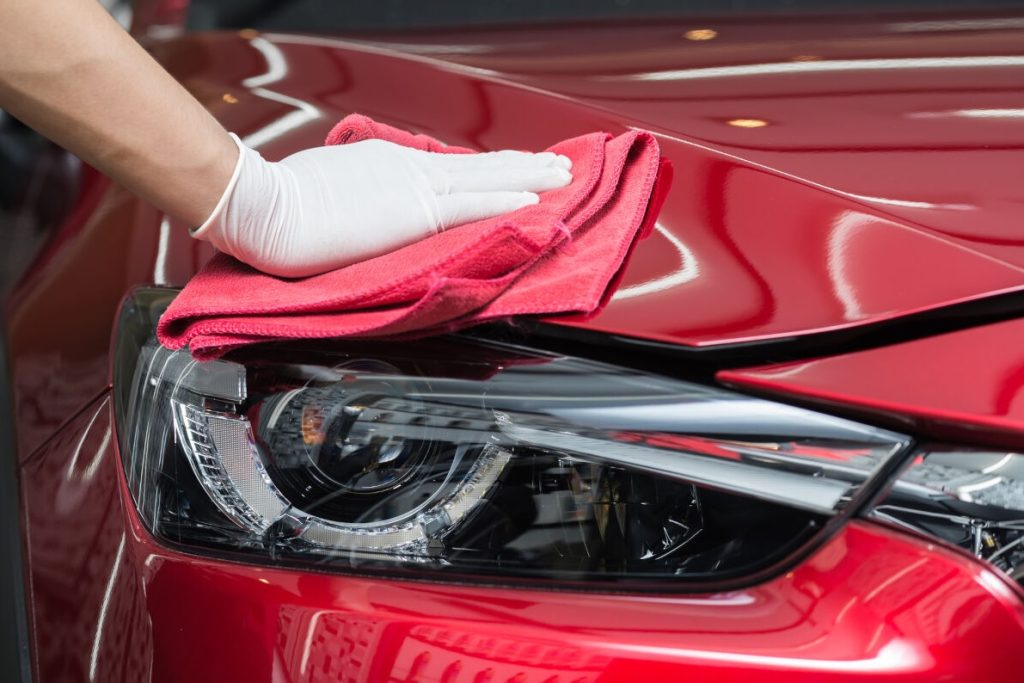In the vast landscape of car maintenance, where the quest for the perfect cleaning solution is perpetual, rubbing alcohol emerges as a compelling yet controversial choice. As car enthusiasts navigate the myriad options available, questions loom about the potential consequences of using rubbing alcohol on their prized vehicles. This article endeavors to take a deep dive into this topic, offering an extensive exploration of the effects of rubbing alcohol and debunking prevalent myths surrounding its interaction with car paint.
Table of Contents
- Understanding the Basics: What is Rubbing Alcohol?
- Common Uses of Rubbing Alcohol in Car Maintenance
- The Concerns: Will Rubbing Alcohol Harm Your Car’s Finish?
- How to Safely Use Rubbing Alcohol on Your Car
- Alternative Solutions for Car Paint Maintenance
- The Role of Frequency and Consistency in Car Care
- Balancing Act: Navigating the Realm of Car Maintenance
- Exploring the Landscape of Car Care Products
- Expert Tips for Safely Using Rubbing Alcohol on Your Car’s Paint
- 1. Dilute Wisely for Precision Cleaning
- 2. Patch Test for Compatibility
- 3. Microfiber Cloth: Your Trusted Companion
- 4. Swift Action: Wipe Promptly
- 5. Consider Alternatives for Regular Maintenance
- 6. Temperature Matters: Avoid Extreme Conditions
- 7. Protective Measures for Plastic Components
- 8. Routine Maintenance is Key
- 9. Monitor Paint Integrity Over Time
- 10. Seek Professional Advice if Unsure
- FAQs About Using Rubbing Alcohol on Car Paint: Clearing the Air on Common Concerns
- Q1: Will rubbing alcohol damage my car’s paint?
- Q2: Can rubbing alcohol cause discoloration on the car’s surface?
- Q3: Is rubbing alcohol safe for plastic components on my car?
- Q4: How often can I safely use rubbing alcohol on my car’s paint?
- Q5: What should I do if I notice adverse effects after using rubbing alcohol?
- Q6: Can I use rubbing alcohol in extreme temperatures?
- Q7: Are there alternative products I can use for car paint maintenance?
- Q8: Should I dilute rubbing alcohol every time I use it on my car?
- Q9: Can I use rubbing alcohol on my car’s windows and mirrors?
- Q10: Is professional advice necessary for using rubbing alcohol on my car?
- Conclusion: The Art and Science of Car Care
Understanding the Basics: What is Rubbing Alcohol?
At the heart of this discussion lies rubbing alcohol, a household staple with isopropyl alcohol as its primary component. Renowned for its versatility, rubbing alcohol has found its way into the toolkit of car enthusiasts seeking effective solutions for a range of maintenance tasks.
Common Uses of Rubbing Alcohol in Car Maintenance
- Removing Stubborn Stains: Rubbing alcohol is the go-to solution for car owners grappling with persistent stains resistant to conventional cleaning agents. Its solvent properties make it adept at dissolving and lifting stubborn blemishes, restoring the car’s surface to its former glory.
- Prepping Surfaces for Adhesion: DIY projects in the automotive realm often involve the application of adhesives, such as vinyl decals or protective films. Rubbing alcohol steps into the scene as a crucial preparatory agent, ensuring a pristine surface for optimal adhesion.
- Quick Decontamination: In the battle against oily or greasy residues tarnishing a car’s aesthetic appeal, rubbing alcohol emerges as a swift and effective decontaminating agent. Its ability to cut through grease proves invaluable for maintaining a spotless appearance.
The Concerns: Will Rubbing Alcohol Harm Your Car’s Finish?
While rubbing alcohol earns accolades for its versatility, concerns persist about its potential impact on a car’s finish. These concerns are not unfounded, and a nuanced exploration is necessary to unravel the truth behind the perceived risks.
1. Chemical Reactions with Clear Coat
The clear coat serves as the protective armor of a car’s paint job. Worries circulate that rubbing alcohol might engage in chemical reactions with this crucial layer, leading to unwarranted consequences such as discoloration or dullness over time. Understanding the intricacies of these chemical reactions is fundamental to assessing the real risks involved.
2. Effect on Plastic Components
Beyond the paint, there is apprehension about rubbing alcohol’s potential impact on plastic components. Trim, mirrors, and other non-metallic surfaces are integral parts of a car’s exterior, and questions arise regarding rubbing alcohol’s compatibility with these diverse materials.
3. Long-Term Impact on Paint Integrity
Repeated use of rubbing alcohol raises legitimate concerns about the long-term integrity of a car’s paint. Enthusiasts worry about potential issues such as peeling, cracking, or other forms of degradation that could manifest over time due to consistent application of rubbing alcohol.
How to Safely Use Rubbing Alcohol on Your Car
While the concerns are valid, incorporating rubbing alcohol into your car care routine can be done safely with the right approach. Here are practical tips to ensure the safe usage of rubbing alcohol without compromising your car’s paint:
- Dilution is Key: Consider diluting rubbing alcohol with water before application. This reduces its potency, mitigating the risk of adverse reactions with the paint or clear coat.
- Test in a Small Area: Before applying rubbing alcohol widely, conduct a patch test in an inconspicuous area of your car. This precautionary step allows you to gauge compatibility without risking damage to visible surfaces.
- Immediate Wiping: Avoid letting rubbing alcohol linger on the surface for extended periods. Promptly wipe off the solution after application to prevent any potential negative effects on the paint or clear coat.
Alternative Solutions for Car Paint Maintenance
For those wary of the potential risks associated with rubbing alcohol, an array of alternative solutions can achieve similar results without the apprehension:
- Automotive Detailing Sprays: Specially formulated detailing sprays provide effective cleaning without the potential risks linked to rubbing alcohol. These products offer a gentler approach to maintaining your car’s appearance.
- Gentle Soap and Water: For mild stains and routine cleaning, a mixture of gentle soap and water often proves sufficient. This traditional method provides a safe and straightforward solution without posing risks to your car’s finish.
- Specialized Car Cleaning Products: The market boasts an assortment of car cleaning products, each designed with specific purposes in mind. From bug and tar removers to pH-balanced car shampoos, these alternatives cater to diverse cleaning needs without compromising your car’s exterior.
The Role of Frequency and Consistency in Car Care
Beyond the choice of cleaning agents, the frequency and consistency of car care practices play a pivotal role in preserving its aesthetic appeal. Whether using rubbing alcohol or alternative solutions, adopting a regular maintenance routine enhances the longevity and overall condition of your vehicle.
In the intricate dance of automotive maintenance, the use of rubbing alcohol requires a balanced approach. While it can be a valuable tool, understanding its limitations and potential risks is essential for preserving your car’s aesthetic appeal.
As a responsible car owner, staying informed about the products you use is paramount. With the right knowledge and precautions, you can navigate the realm of rubbing alcohol in car maintenance without compromising your vehicle’s paint integrity. Remember, informed choices and proactive care contribute to a car that not only looks good but also stands the test of time on the road.
Exploring the Landscape of Car Care Products
The world of car care is teeming with an array of products designed to cater to every conceivable need. Understanding the offerings in the market empowers car owners to make informed choices tailored to their specific requirements. (See Also: How to Clean Mothers Powerball: Ultimate Guide for Sparkling Results)
1. Detailing Waxes and Sealants
Detailing waxes and sealants play a crucial role in protecting a car’s paint from environmental elements. These products create a protective layer that shields the paint from UV rays, contaminants, and harsh weather conditions. Regular application enhances the longevity of the paint job, contributing to a vibrant and well-maintained exterior.
2. Clay Bars for Decontamination
Clay bars are indispensable tools for decontaminating a car’s surface. They effectively remove embedded contaminants such as road tar, tree sap, and industrial fallout. Incorporating clay bar treatment into your car care routine ensures a smooth and contaminant-free surface, laying the foundation for subsequent detailing steps.
3. Ceramic Coatings for Long-Term Protection
For enthusiasts seeking long-term protection for their car’s paint, ceramic coatings offer an appealing solution. These coatings form a durable and hydrophobic layer on the paint, providing resistance against environmental pollutants, bird droppings, and water spots. While the application process requires precision, the benefits of enhanced protection and ease of maintenance make ceramic coatings a popular choice.
4. pH-Balanced Shampoos for Gentle Cleaning
The choice of car shampoo significantly influences the efficacy of your washing routine. pH-balanced shampoos are gentle on the paint while effectively removing dirt and contaminants. Regular use maintains the integrity of the paint, ensuring a clean and well-preserved appearance.
5. Tar and Bug Removers for Stubborn Contaminants
Road tar and bug residues can adhere stubbornly to a car’s surface, requiring specialized solutions for removal. Tar and bug removers are formulated to dissolve and lift these tenacious contaminants without harming the paint. Including these targeted cleaners in your detailing arsenal helps address specific challenges encountered during regular driving.
Expert Tips for Safely Using Rubbing Alcohol on Your Car’s Paint
Navigating the intricate world of car maintenance involves not only understanding the products at your disposal but also mastering the art of application. When it comes to using rubbing alcohol on your car’s paint, expert tips can make a significant difference. Let’s delve into some valuable insights to ensure you harness the benefits of rubbing alcohol without compromising your car’s finish.
1. Dilute Wisely for Precision Cleaning
Before applying rubbing alcohol, consider diluting it with water to achieve the desired potency. This not only enhances its safety for your car’s paint but also allows for precise cleaning without unnecessary risks. A well-calibrated mixture strikes the perfect balance between effectiveness and paint protection.
2. Patch Test for Compatibility
Conduct a patch test in an inconspicuous area before widespread use. This precautionary step helps you gauge how your car’s paint reacts to rubbing alcohol. Different car finishes may respond differently, and a patch test ensures you are well-informed about the compatibility of rubbing alcohol with your specific vehicle.
3. Microfiber Cloth: Your Trusted Companion
When applying rubbing alcohol, opt for a high-quality microfiber cloth. These soft and absorbent cloths minimize the risk of scratches and ensure even application. Additionally, microfiber cloths are gentle on the paint, providing a smooth cleaning experience without compromising the integrity of the surface.
4. Swift Action: Wipe Promptly
Rubbing alcohol should not linger on your car’s surface. Promptly wipe off the solution after application to prevent any potential negative effects on the paint or clear coat. Swift action minimizes the exposure time, allowing you to enjoy the benefits of rubbing alcohol without unnecessary risks.
5. Consider Alternatives for Regular Maintenance
While rubbing alcohol is effective for specific tasks, consider alternative solutions for routine maintenance. Automotive detailing sprays, gentle soap and water, and specialized car cleaning products can offer effective cleaning without the potential risks associated with rubbing alcohol. Tailor your approach based on the nature of the cleaning task at hand.
6. Temperature Matters: Avoid Extreme Conditions
When using rubbing alcohol, be mindful of the temperature. Extreme heat or cold can impact its effectiveness and potentially alter its interaction with the car’s paint. Optimal application conditions contribute to a seamless cleaning experience without unintended consequences. (See Also: How to Remove Rubbing Compound Haze: A Step-by-Step Guide for Flawless Finish)
7. Protective Measures for Plastic Components
If your car features plastic components, take extra precautions. Shield non-metallic surfaces, such as trim and mirrors, from direct contact with rubbing alcohol. This proactive approach minimizes the risk of adverse reactions and ensures that your entire vehicle receives the care it deserves.
8. Routine Maintenance is Key
Incorporate rubbing alcohol judiciously into your routine maintenance rather than relying on it exclusively. Regular cleaning with suitable products and methods contributes to the overall health and longevity of your car’s paint. Strike a balance between the occasional use of rubbing alcohol and a consistent, well-rounded maintenance routine.
9. Monitor Paint Integrity Over Time
Keep a vigilant eye on your car’s paint integrity over time, especially if you frequently use rubbing alcohol. Look for signs of discoloration, dullness, or any unusual changes. Regular monitoring allows you to catch potential issues early and take corrective measures before they escalate.
10. Seek Professional Advice if Unsure
If uncertainties persist or you encounter unique circumstances, seek professional advice. Consulting with automotive detailing experts or professionals in the field can provide tailored insights based on your specific car make and model. Their expertise ensures that you make informed decisions regarding the care of your vehicle.
Incorporating these expert tips into your car maintenance routine empowers you to make the most of rubbing alcohol’s benefits while safeguarding your car’s paint. Remember, an informed and proactive approach ensures that your vehicle not only looks impressive but also maintains its allure for the long haul.
FAQs About Using Rubbing Alcohol on Car Paint: Clearing the Air on Common Concerns
As car enthusiasts explore various cleaning solutions, questions often arise regarding the use of rubbing alcohol on car paint. To address these common concerns and provide clarity, we’ve compiled a set of frequently asked questions along with detailed answers. Let’s delve into the queries that may be lingering in your mind.
Q1: Will rubbing alcohol damage my car’s paint?
A: While rubbing alcohol can be effective for specific tasks, its potential to damage car paint depends on various factors. Proper dilution, testing in an inconspicuous area, and swift wiping can minimize risks. However, frequent or prolonged use may pose concerns over time.
Q2: Can rubbing alcohol cause discoloration on the car’s surface?
A: There is a possibility of discoloration, especially if rubbing alcohol reacts with the clear coat. Dilution and immediate wiping after application help reduce this risk. Monitoring your car’s paint over time allows you to address any discoloration promptly.
Q3: Is rubbing alcohol safe for plastic components on my car?
A: While rubbing alcohol is generally safe for metal surfaces, caution is advised when dealing with plastic components. Shield non-metallic areas during application to prevent potential adverse reactions. Consider alternative products for plastic components in your routine maintenance.
Q4: How often can I safely use rubbing alcohol on my car’s paint?
A: The frequency of use matters. While rubbing alcohol can address specific stains, incorporating it into routine maintenance should be approached judiciously. Overuse may compromise the long-term integrity of the paint. Consider alternative solutions for regular cleaning tasks.
Q5: What should I do if I notice adverse effects after using rubbing alcohol?
A: If you observe any adverse effects such as discoloration, dullness, or changes in the paint’s appearance, take immediate action. Cease using rubbing alcohol and consult with automotive detailing professionals for tailored advice based on your car’s make and model. (See Also: Meguiar’s Ultra Cut Compound vs Ultimate Compound: Unveiling the Best Polishing Power)
Q6: Can I use rubbing alcohol in extreme temperatures?
A: Extreme temperatures can affect rubbing alcohol’s effectiveness and interaction with paint. It’s advisable to apply rubbing alcohol in optimal conditions, avoiding extreme heat or cold. This ensures a seamless cleaning experience without unintended consequences.
Q7: Are there alternative products I can use for car paint maintenance?
A: Yes, several alternative products cater to car paint maintenance without the potential risks associated with rubbing alcohol. Automotive detailing sprays, gentle soap and water, and specialized car cleaning products offer effective cleaning solutions for various needs.
Q8: Should I dilute rubbing alcohol every time I use it on my car?
A: Dilution is recommended for precision and safety. While it may not be necessary for every use, diluting rubbing alcohol before application allows you to control its potency, minimizing the risk of adverse reactions with the paint or clear coat.
Q9: Can I use rubbing alcohol on my car’s windows and mirrors?
A: Rubbing alcohol can be used on glass surfaces without significant concerns. However, exercise caution with coated or tinted windows. Testing in a small area and immediate wiping are key practices to ensure optimal results without unintended consequences.
Q10: Is professional advice necessary for using rubbing alcohol on my car?
A: Seeking professional advice is advisable, especially if uncertainties persist or unique circumstances arise. Automotive detailing experts can provide tailored insights based on your specific car make and model, ensuring informed decisions regarding your vehicle’s care.
Conclusion: The Art and Science of Car Care
In the pursuit of maintaining a car’s aesthetic appeal, car care transcends the realm of routine cleaning. It evolves into a meticulous blend of art and science, where informed choices, diligent practices, and the right products converge to preserve and enhance the beauty of your vehicle.
As you navigate the diverse landscape of car care, remember that each product and technique plays a unique role in the overall maintenance of your car. Whether opting for the versatility of rubbing alcohol or exploring alternative solutions, the key lies in understanding your car’s needs, staying informed, and adopting a proactive approach to care.
In the grand tapestry of automotive enthusiasts, your car is a canvas awaiting your touch. With the right knowledge and a touch of passion, you can embark on a journey of car care that not only safeguards your vehicle but also elevates it to new heights of elegance and longevity on the open road.


